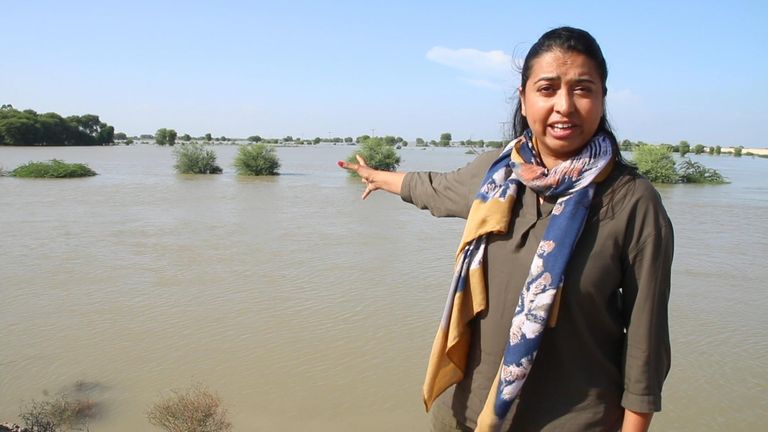The brave people of Pakistan who are now displaced feel angry and abandoned over deadly floods
Driving through Sindh province in Pakistan, you expect to see crops of wheat, sugar cane and rice, and mango, date and banana trees.But just a few hours drive into the province away from the busy city of Karachi, all I see is water, after the country was hit by the worst flooding in its history.
It’s like an ocean. Still and calm, having destroyed and drowned all in its path.There is no life on the horizon, no bustling communities or farmers and farm workers. They have retreated.Those who are left on the little land that remains drag the belongings they have salvaged up muddy banks and roadsides.
Please use Chrome browser for a more accessible video player
2:50
Pakistani village submerged by deadly floods
The highway is just high enough not to be submerged, and they are sitting on the hot ground with the sun beating down on them, at the mercy of the extreme weather.Pakistan has been subjected to a heatwave that’s brought record-breaking temperatures of 53C (127F) in the Sindh province, melted glacial ice in the north, caused lakes in the foothills of the Himalayas to burst their banks and a monster monsoon.
More on Pakistan
Related Topics:
The people here, resilient and brave, are putting up makeshift shelters using skeletal sticks and branches.Some have used their clothes as a tent cover, giving them hardly any protection from the rain or the sun.
Advertisement
But as resilient as they are, they are angry and say they have been abandoned.Read more:Why Pakistan is at ‘ground zero’ of the climate crisisPictures reveal devastating impact of Pakistan’s floodsQueen and PM send messages to Pakistan
We have not found many people who have received any aid.Pakistan has admitted being stretched in capacity and resources and has made an international appeal.They are calling for a global response to what they say is a global crisis.
For despite Pakistan’s low emissions and small carbon footprint, it is paying a heavy price and consequences – it is amongst the world’s top 10 worst-affected countries.Officials are calling this the ‘ground zero’ for the world’s existential crisis – climate change – and Pakistan and Pakistanis are bearing witness.

Driving through Sindh province in Pakistan, you expect to see crops of wheat, sugar cane and rice, and mango, date and banana trees.
But just a few hours drive into the province away from the busy city of Karachi, all I see is water, after the country was hit by the worst flooding in its history.
It’s like an ocean. Still and calm, having destroyed and drowned all in its path.
There is no life on the horizon, no bustling communities or farmers and farm workers. They have retreated.
Those who are left on the little land that remains drag the belongings they have salvaged up muddy banks and roadsides.
The highway is just high enough not to be submerged, and they are sitting on the hot ground with the sun beating down on them, at the mercy of the extreme weather.
Pakistan has been subjected to a heatwave that’s brought record-breaking temperatures of 53C (127F) in the Sindh province, melted glacial ice in the north, caused lakes in the foothills of the Himalayas to burst their banks and a monster monsoon.
The people here, resilient and brave, are putting up makeshift shelters using skeletal sticks and branches.
Some have used their clothes as a tent cover, giving them hardly any protection from the rain or the sun.
But as resilient as they are, they are angry and say they have been abandoned.
Read more:
Why Pakistan is at ‘ground zero’ of the climate crisis
Pictures reveal devastating impact of Pakistan’s floods
Queen and PM send messages to Pakistan
We have not found many people who have received any aid.
Pakistan has admitted being stretched in capacity and resources and has made an international appeal.
They are calling for a global response to what they say is a global crisis.
For despite Pakistan’s low emissions and small carbon footprint, it is paying a heavy price and consequences – it is amongst the world’s top 10 worst-affected countries.
Officials are calling this the ‘ground zero’ for the world’s existential crisis – climate change – and Pakistan and Pakistanis are bearing witness.


